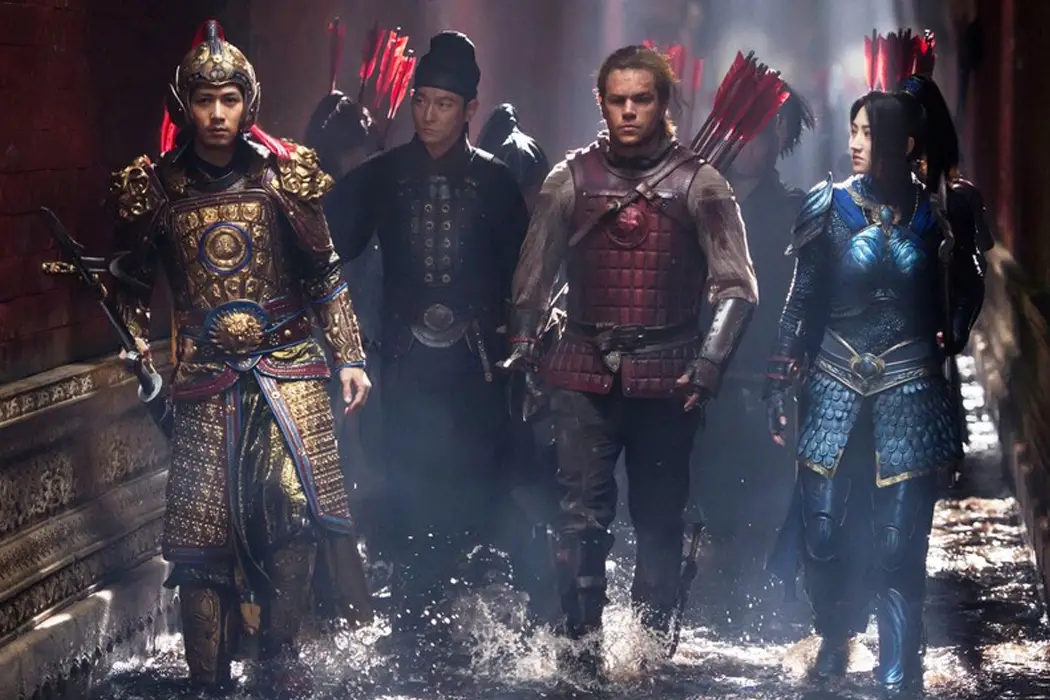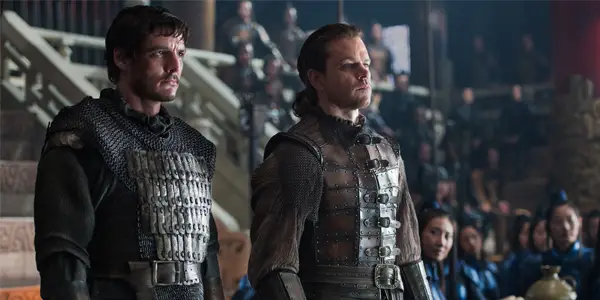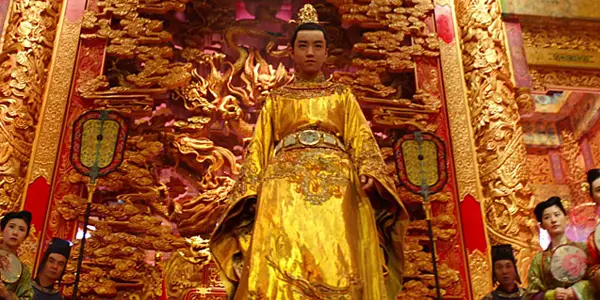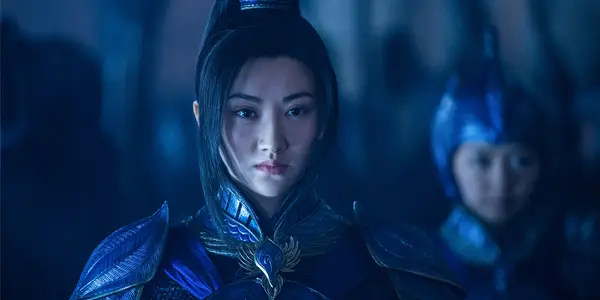THE GREAT WALL: Not Even Worth A Wall Pun

Alex is a 28 year-old West Australian who has a…
It’s no lie that the movie industry is currently in the middle of a transformative struggle, leaning on fewer giant tentpole summer releases to keep themselves afloat, against a series of decreasing financial returns, the rise of the VOD/torrent downloads and a greater focus on television.
With mainstream movies not being as much of a dependable return on investment nowadays, big blockbusters need to have built-in audiences and guaranteed financial returns to justify their existences. These guarantees can be seen by the sharp increase in remakes, reboots and sequels, all films which contain recognisable properties/ideas that mean some form of established audience will certainly see the film.
Another sign of financial security is the use of international locations and stars, meaning that the films can do incredibly well in the respective countries that the actor/location originates from. An example of this can be seen recently in Now You See Me 2, which added the Chinese actor Jay Chou into the film’s crowded ensemble.
Whilst most American audiences may not recognise Chou, he is an incredibly popular actor/singer in China and other foreign markets, meaning his involvement immediately gets the film more exposure and assurance that those countries will contribute heavily to the film’s international box office numbers, a hefty figure that is incredibly important in creating a profit with big mainstream films nowadays, due to the decreased American cinematic turnout.
The Best of Both Worlds
This process explains why we have The Great Wall, a largely forgettable and flavourless affair that is meant to act as bridge between the US and Chinese film markets and cultures. With the Chinese film markets in an incredible boom, director Zhang Yimou has made The Great Wall as an enticing look at the potential of Chinese entertainment within Western mainstream markets, taking them from niche arthouses and making them something audiences can access anywhere.
To do this, The Great Wall employs three recognisable American actors; Matt Damon due to his established star power, Pedro Pascal, who everyone knows from Game of Thrones and Willem Dafoe, who represents the more artistic side of American cinema.

With these three well known actors leading the cast, Yimou is free to employ a series of well established Hong Kong and Chinese actors, not only to entice Chinese/Hong Kong audiences, but to highlight their screen talents to Western audiences, who may enjoy their work and seek out their older work or await their next project. Although this is a noble and ambitious plan, the ultimate problem is that the film is too bland and generic to achieve this goal.
It employs a frequent amount of action movie cliches, paired with some subpar special effects and rudimentary acting that equals to a standard fantasy action movie that has been done countless times in America, meaning that outside of the film’s actors and location, it doesn’t do anything to distance itself from stereotypical Western cinema enough to contribute anything new or worthwhile that might’ve made the film a great representation of future Chinese/Western collaborations.
Set during the Sony Dynasty (960-1279) in China, The Great Wall focuses on William (Matt Damon) and Tovar (Pedro Pascal) a pair of American ex-soldiers who are searching China for the mysterious “black powder” (gunpowder). Hunted by bandits, William and Tovar find themselves continuously on the run, until they find their tracks halted by the Great Wall, which houses a secret division of the Imperial army.
Originally treated as traitorous prisoners, William and Tovar slowly discover why such a large army lives in the Great Wall – at random times, a large horde of lizard-like creatures descend from the mountains, attempting to enter mainland China to feast upon the villagers. Showing their capabilities as warriors, William and Tovar are recruited by the army to help fend off these creatures, who are getting smarter and stronger with each new battle.
What Went Wrong
Although ridden with cliches, the plot is a fairly solid foundation to build upon a big action epic, an East meets West type of story where humans comes together to battle giant CGI creatures. Everything about this film should be fun and goofy, but the big problem with it is that it’s so straight-faced and lacking in any self-reflexivity, so that, aside from a couple of lame one-liners, the film never attempts to go the distance with its inherently silly premise.
The Great Wall shares similar vibes to Guillermo Del Toro’s Pacific Rim, as men and women of different ethnicities team together to take down a race of creatures who repeatedly attack Earth, developing and learning with each battle. Whereas Pacific Rim worked on its world-building aspects, paired with some self-awareness and indulged in the fun of watching humans battle these big creatures, The Great Wall lacks any of it.

This is made unfortunate by the film’s lavish production design, an impressive array of practical set design and costumes that really puts its best effort in selling the visual aesthetics of the film, making up for where the lacklustre script leaves off. The dedicated production design also brings forth just how unimpressive the computer generated effects are, whilst any crowd scenes of the creatures are perfectly fine, anytime one of the them is lingered on for more than a minute, the poor quality of the CGI becomes apparent, which feels like something from the early 2000’s.
After seeing the visual marvels of The Jungle Book and Moana, showing what we can do with animation studios nowadays, it really does make The Great Wall look quite amateurish in comparison, especially with the huge budget this film had.
Trying Your Best
Another huge detriment is the acting, a selection of odd decisions made by an ensemble of talented people. Matt Damon is still one of America’s most beloved actors working today, who has very rarely ever given a bad performance, even delivering great work within lesser films. That’s why his portrayal of William in The Great Wall is so questionable, playing an American with a weirdly wavering accent that jumps from Spanish to Irish to Southern American depending on the scene, an affected voice that diminishes his performance in this film greatly.
Outside of his weird voice, he’s in coasting mode here, giving the film the leading man chops necessary to command the film, but nothing more. Pedro Pascal tries his best, but unfortunately his marred with bad material and is side-lined for majority of the picture.

The Chinese and Hong-Kong casts are given the same results, with established actors Andy Lau and Jing Tian trying their best with the stiff narrative attributes and predictable lines that define their respective characters. It’s worth noting that Willem Dafoe is in the film too, but his role is so useless (he mainly exists to explain why the Chinese cast can speak English) and peripheral that he could’ve been completely cut from the film and it wouldn’t change a thing. You get the feeling that he understands what type of film he’s in and tries to breath some form of unique life into his character, but the film’s so limited by its by-the-numbers nature that it strangles the life out of all those involved.
Conclusion
Unfortunately, there aren’t many positive things to really highlight about The Great Wall. Some may enjoy the goofier aspects of the action sequences, where Damon’s seemingly supernatural archery abilities are unnecessarily highlighted to give his character any form of personality, but they are few and far between to make for a consistent good time.
This is the worst type of bad action film, too expensive and straight faced to be considered “So Bad It’s Good”, with its frequent reliance on fulfilling a predictable series of story beats and character traits means that the audience is never surprised. And Yimou, trying to attain interest from both Chinese and American audiences, never experiments too much with the form for fear of distancing either.
With such a big canvas to lay such cliched material upon, it really does feel like placing a Big Mac upon gold plated silverware; whilst it might seem like you’ve been served something nice and unique, it really is just more insubstantial junk to feast upon.
What did you think of the future of more American/Chinese collaborations?
The Great Wall is out now in the UK and US. All international release dates are here.
Does content like this matter to you?
Become a Member and support film journalism. Unlock access to all of Film Inquiry`s great articles. Join a community of like-minded readers who are passionate about cinema - get access to our private members Network, give back to independent filmmakers, and more.













